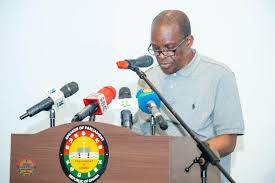By: Christian Kpesese
The Speaker of Parliament, Rt. Hon. Alban Sumana Kingsford Bagbin, has underscored the critical role of strong collaboration among all arms of government in ensuring the successful implementation of Government’s flagship 24-Hour Economy Programme.
Opening a three-day post-budget workshop for Members of Parliament in Accra, the Speaker cautioned that infrastructure alone is insufficient for achieving the programme’s ambitious objectives. He stressed that its success hinges on a renewed and revised legal framework, as well as an appropriate governance structure supported by all key institutions, including the Audit Service.
The post-budget workshop is expected to expose lawmakers to the full details of government’s economic agenda. This, according to parliamentary officials, will enable MPs to exercise effective oversight from an informed position as they debate the motion presented by the Minister for Finance, and subsequently consider and approve budget estimates for the various Ministries, Departments, and Agencies (MDAs).
Background:
The 24-Hour Economy is a central policy initiative introduced by the Mahama administration, designed to stimulate round-the-clock economic activity, expand job opportunities, enhance productivity, and improve public service delivery.
First popularised during the 2024 election campaign, the policy aims to position Ghana as a competitive, investment-friendly hub by enabling businesses and essential services to operate in three shifts across the day.
The Minister for Finance, Dr. Cassiel Ato Baah Forson, on November 13, 2026, presented the 2027 Budget and Economic Policy Statement—President Mahama’s first full-year budget—to Parliament. The budget outlined key fiscal and policy measures intended to operationalise the 24-Hour Economy, including infrastructure support, sector incentives, and institutional reforms.



